Covid: 'Getting the vaccine in Ramadan helps others'
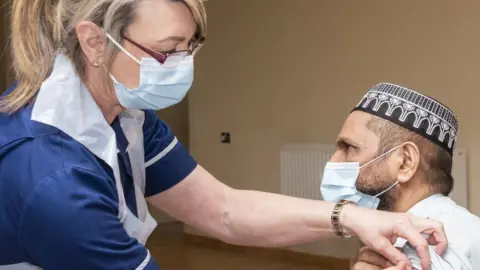 Tracey Whitefoot
Tracey WhitefootA series of pop-up vaccination centres in mosques have been set up to support Muslims to get a Covid vaccination during Ramadan, after concerns from Islamic scholars and NHS leaders that the fasting period may discourage some. BBC News meets people who are welcoming the new services.
The start of Ramadan means millions of Muslims will begin fasting during daylight hours for a month.
But there have been concerns among health bosses that some may delay getting their vaccines as a result.
During Ramadan, many Muslims abstain from allowing anything to enter their body, such as food and drink, between sunrise and sunset.
Senior NHS workers who are Muslims and the British Islamic Medical Association have issued assurances having the vaccination will not break the fast and the NHS has set up pop-up vaccination centres at mosques, workplaces and community centres, with options such as out-of-hours and women-only clinics being considered.
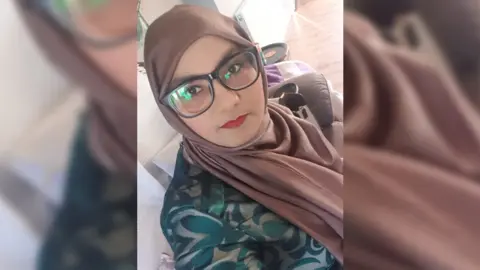 Erum Suleman
Erum SulemanErum Suleman, from Derby, said she thought the comfortable and familiar settings would encourage other Muslims to get their jabs.
Mrs Suleman, who had her vaccination on Friday - just before Ramadan began this week - said: "Some local people might feel more comfortable going to the community centre, because they know the people there, and they can walk there, and I think these things are a big help."
The 43-year-old, who founded the charity Erum's Helping Hand, said there had been hesitancy among some Muslims in her community about taking up the vaccine.
She added: "I have heard people talking about whether they are going to get the vaccine or not and I would say to people that sooner or later we all need to get it, so just go as soon as you are invited... and then we can see our parents and families again.
"A lot of people in the community know me through my charity work so I thought if people saw me getting the jab done then they might book theirs too."
Mrs Suleman added she felt having the vaccination was, in fact, in keeping with the aims of Ramadan.
"Whatever we do for good in those 30 days of Ramadan, this is a good step for the future, for our children and for our families," she said.
"By doing this we are showing that we care for others, our community, for everybody, and we are helping others - which is what Ramadan is about."
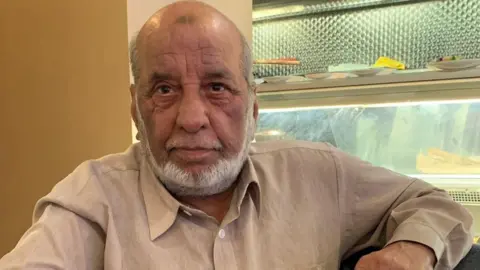 Yunas Naroo
Yunas NarooYunas Naroo from West Bridgford, Nottinghamshire, is due to have his second vaccination during Ramadan.
The 83-year-old said he had sought advice on having the vaccine during the holy month and was confident it was safe to do so.
"I enquired about it, but I've not been worried," he said.
"I had my first vaccine and didn't feel any side effects at all so I wasn't worried about the second dose.
"I have been fasting for a long time, since I was young, so my body is used to it."
Mr Naroo, who is the vice chairman of the Jamia Masjid Sultania mosque in Sneinton, Nottingham, said he was aware of some concerns within the community.
"I know some people are worried about having the vaccine and everyone has their own opinions, but I don't see any problem with it," he said.
"I recommend everybody should have it when they are asked to book, just to be on the safe side."
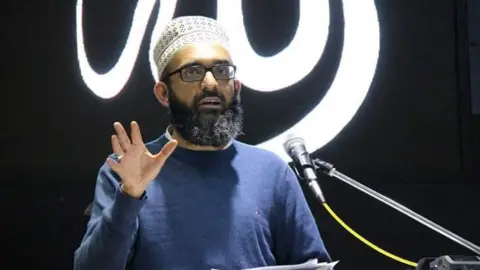 Bradford Grand Mosque
Bradford Grand MosqueLeicester Imam Dr Ather Hussain said he had been telling worshippers having the vaccination is "a form of worship".
"Worship is anything that brings kindness and unity to the people around you," he said.
"Walking around and refusing to take the vaccine or any precaution is irresponsible and selfish.
"Anything which reverses that trend and protects you and your neighbours - that's a form of worship."
He added he believed the timing of Ramadan this year was "just so important".
"It opens your eyes to our responsibilities and who and what matters in your life, and in the pandemic, everyone matters," he said.
"This virus has taken everyone from society - of every race and religion - and we have all got to be careful and responsible."
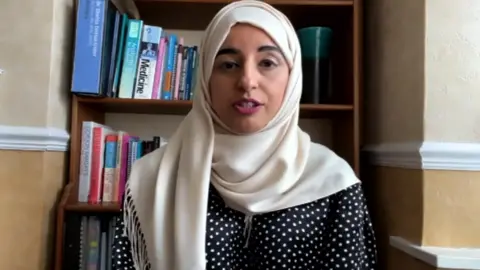
Dr Shehla Imtiaz-Umer, a Derby GP and representative of the British Islamic Medical Association (BIMA), believed it was important not to delay the vaccination programme.
"As Muslims we have a duty to preserve life and getting vaccinated is the most effective way to prevent illness and loss of life from Covid-19," she said.
"We must now stand together and not allow this progress to halt during Ramadan."

- VACCINE: How do I know the Covid vaccine is safe?
- WORLD LOOK-UP: Where in the world are cases highest?
- SYMPTOMS: What are they and how to guard against them?
- TESTING: What tests are available?

Follow BBC East Midlands on Facebook, Twitter, or Instagram. Send your story ideas to [email protected].
